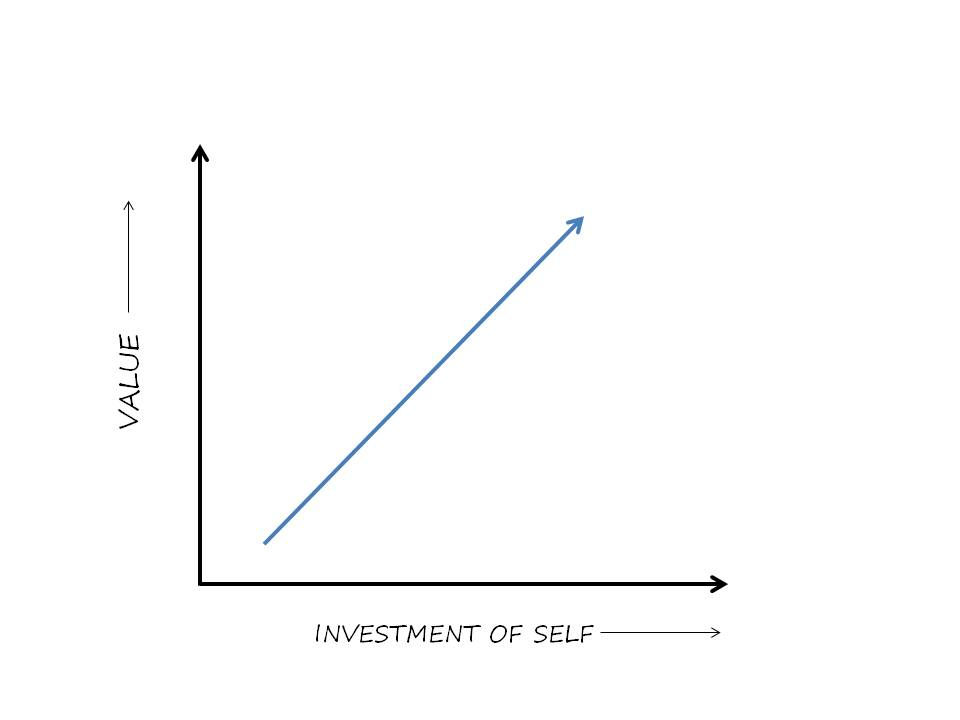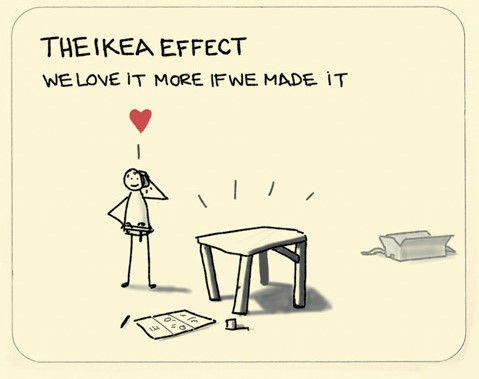Why is love unreasonable? The IKEA Effect Perspective
- Neha Mishra

- Jul 22, 2020
- 4 min read
Updated: Aug 21, 2022
(If this article is too long, read in Tidbits.)
If you were the believer of love leads to labor, it's time to believe the opposite too: Labor leads to love. The more effort you put into something, the more you find excuses to value it. Straight and simple, this is the IKEA effect. Probably one of the most primary attributes of anything to keep you hooked onto it, coined by Dan Ariely, Michael Norton, and Daniel Mochon in a 2011 study.

IKEA is a Swedish furnishing company that sells its furniture in parts instead of a united whole. Suppose you bought a chest of drawers from IKEA, what you actually get are the woodblocks perfectly sized for your drawers and some nuts and bolts. IKEA provides a manual and makes the process of assembling furniture at home by yourself or with your peers an indulging task as a DIY. So, you read the manual and bring together all the components with nuts, bolts, or glue. Imagine the satisfaction and sense of achievement when you complete assembling your furniture parts. More than that, there’s a sense of investment on a personal level. In that case, it is more likely for you to value your self-assembled furniture over a readymade one. I might even click a photograph of the drawers and upload it on IG story celebrating my latest accomplishment.

Now think, is it just IKEA leveraging the emotional connect we develop while we add value somewhere? Think hard. There are a series of things you can list. But did you think of your social media accounts? Let’s consider your Instagram profile. When you created it, you added some information about your email address, username, D.O.B., profile picture, etc. You followed your peers and your role models. If you left your IG account on that very day, it might not have been as painful as if you were asked to abandon your account after using it for 6 months, having posted 50 pictures, harnessed 250 likes on each post, built a follower list of 1000 people, made 7 highlight sections with a minimum of 14 stories each, received comments on your post from special people, achieved 200+ viewers of your IG story, and more.
Can’t relate? Imagine shifting home after having spent, say, 15 years in one place. You leave behind uncountable memories, of course, but you actually leave behind every connection you built with that house across 15 years. The IG example doesn’t compare in sentiments here but it explains the concept of what happens with social media sites. We also indulge ourselves so much into "completing our profile" never actually knowing where this completion ends.
Our repeated interaction, stored information, personalized interaction, or service all add on to the value we harness with a particular place, thing, person, channel, or media.
The IKEA effect is not all roses and lilies. This is a psychological trait that makes moving on from even toxicities a difficult task. Because if you spent more effort building something, chances are you are giving more shit about it than you should. It happens with our relationship with friends, partner, spouse, and so on. If you are holding onto a job you don't like, it's most probably for this reason.

Our mind is designed to make us feel better about things we invest more in. Did you spend hours playing a game to win a special badge? Definitely that badge has to be valuable to you but it won't be to anybody else who did not play that game for long hours. The amount of value we associate with something based on our investment often disrupts a logical valuation of the object. We relate higher price quotes with the quality of the product and try to justify it, while the price relates more to the brand, and the product might not be as fine quality as to be justifiable for its price.
Escalation of Commitment:
You put effort into sticking to something and you get more stuck with it. A fiction with a boring plot would better be left after a half-read than spending more time to complete it. You can perhaps call an assistant to set up your IKEA furniture than to build it yourself when you could be more productive with your effort and time.

We are so committed to our previous efforts that each time we have a choice to let go, we keep adding more to it with hope because we are emotionally bonded and rationally blinded. Hence we get furthermore committed. Letting go is the toughest choice because we seem to lose everything associated, the real and the imaginary.
But imagine sticking to age-old furniture because you built them, when they don't fit well into your new house, don't match with your wall-paints and the curtains, degrade the shine and feel of the house. Your IKEA effect will add junk to your new home.
While half the world is vexed with commitment issues, quitting can be a valuable trait too for certain cases. Provided you know when to quit and what to quit.




Loved this one! IKEA ♥️